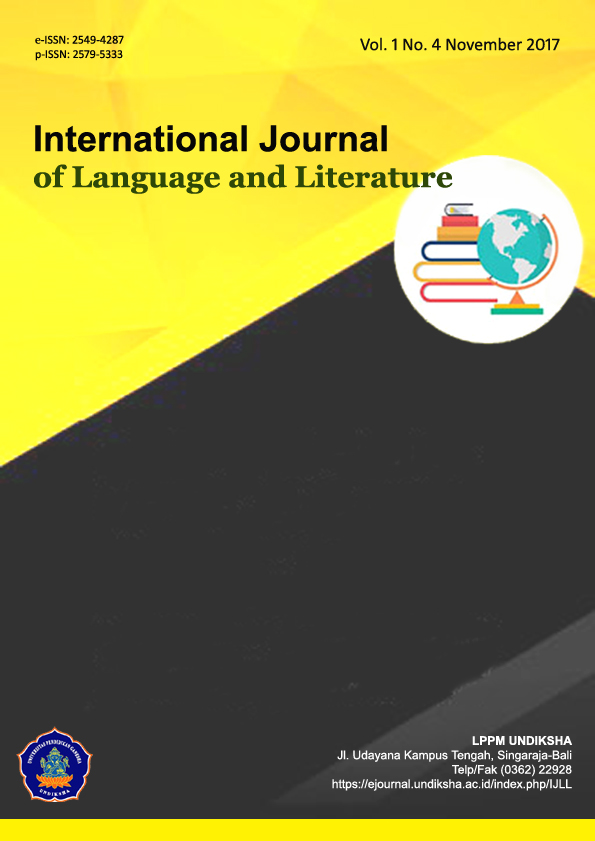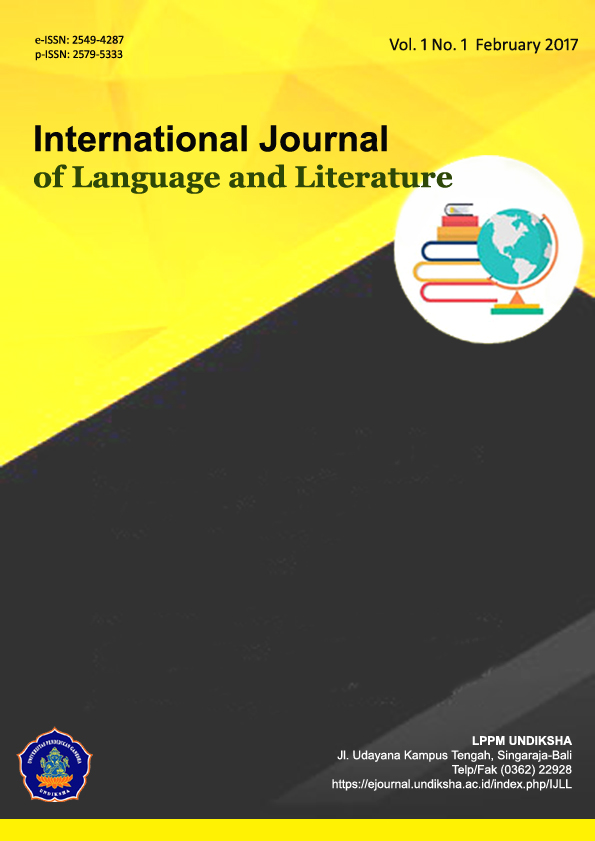SELF-REGULATED LEARNING IMPLEMENTED BY THE STUDENTS OF ELEMENTARY SCHOOL IN BULELENG SUB-DISTRICT
DOI:
https://doi.org/10.23887/ijll.v1i4.12585Kata Kunci:
Curriculum 2013, elementary school students, self-regulated learningAbstrak
This study highlights the implementation of each aspect of self-regulated learning in cyclical phase which was proposed by Zimmerman and Moylan (2009). With an aim to identify whether elementary school students in Buleleng Subdistrict implement self-regulated learning or not, this study used descriptive qualitatively research design to describe comprehensively the implementation of self-regulated learning in elementary school students. SDN 3 Banjar Jawa, SDN 4 Banyuasri, SD Laboratorium Undiksha, and SDN 4 Kampung Baru became the setting of this study because those schools have implemented curriculum 2013 which means that those schools have implicitly implemented self-regulated learning. There were 544 students from grade 1 until 6 which were chosen randomly as the subject of this study. The instruments used in this study were observation checklist, questionnaire which was consisted of 20 statements which had been distributed to subject of the study, and also interview guide which was used to interview several students from the subject of the study. The result of the study shows that most of elementary school students in Buleleng sub-district had implemented self-regulated learning.
Referensi
Ahmad, D. (2014). ‘Understanding the 2013 Curriculum of English Teaching through the Teachers‟ and Policymakers‟ Perspectives’, International Journal of Enhanced Research in Educational Development (IJERED), 2(4), pp. 6–15. doi: 2320-8708.
American Psychological Association. (1997). “Learner-Centered Psychological Principles: A Frameworks for School Reform and Redesign.
Felder, R.M., and Brent, R. (2007). Cooperative Learning. P.A. Mabrouk, ed., Active Learning: Models from the Analytical Sciences, ACS Symposium Series 970, Chapter 4, pp. 34–53. Washington, DC: American Chemical Society.
Johnston, Taylor, (2016). "Elementary School Students’ Self-Regulated Learning and Features of Classroom Contexts". Undergraduate Honors Theses. Paper 47.
Johnson, D., Johnson, R. and Smith, K. (2013). Cooperative Learning: Improving University Instruction By Basing Practice On Validated Theory. Journal on Excellence in University Teaching.
Nur, M.R. and Madkur, A. (2015). ‘Teachers’ Voices On The 2013 Curriculum For English Instructional Activities’, IJEE (Indonesian Journal of English Education), 1(2). doi: 10.15408/ijee.v1i2.1340.
Nunan, David. (1997). Syllabus Design. Newyork: Oxford University Press.
Permendikbud Nomor 67 Tahun 2013 tentang Kerangka Dasar dan Struktur Kurikulum Sekolah Dasar / Madrasah Ibtidaiyah
Said, I., Sutadji, E. and Sugandi, M. (2016). The Scientific Approach-Based Cooperative Learning Tool for Vocational Students Vocation Program of Autotronic (Automotive Electronic) Engineering. IOSR Journal of Research & Method in Education (IOSR-JRME), 6(3), pp.67-73. doi: 10.9790/7388-0603046773.
Undang-Undang Republik Indonesia Nomor 20 Tahun 2003 tentang Sistem Pendidikan Nasional
Wangid, M. N. (2014). Student-Centered Learning: Self-regulated Learning. International Conference on Fundamentals and Implementation of Education (ICFIE).
Zimmerman, B. J. (1989). A Social Cognitive View of Self-Regulated Academic Learning. Journal of Educational Psychology, 81, 329-339.
Zimmerman, B. J. (2002). Be-coming a Self-Regulated Learner: An Overview. Theory into Practice, 41, 64–70.
Zimmerman, B.J., & Moylan, A.R., (2009). Self-regulation: Where metacognition and motivation intersect. In D.J. Hacker, J. Dunlosky, & A.C. Graesser (Eds.), Handbook of Metacognition in Education (pp. 299-315). New York: Routledge.
Unduhan
Diterbitkan
Cara Mengutip
Terbitan
Bagian
Lisensi
IJLL Journal provides immediate open access to its content on the principle that making research freely available to the public to supports a greater global exchange of knowledge.

This work is licensed under a Creative Commons Attribution-ShareAlike 4.0 International License








